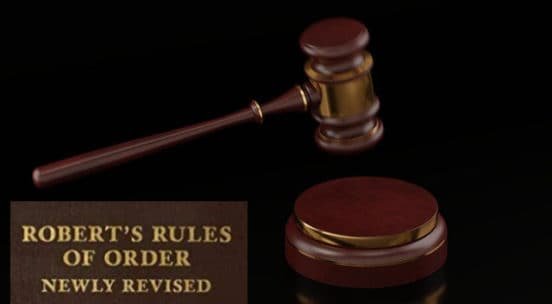Director/Parliamentarian remarks – Nancy Luehring
Can a board member be the Parliamentarian and also retain all voting, motion making rights and all other duties of a director? Yes
There has been much conversation regarding having a resident non Board member as the Parliamentarian because of the misconception that a voting and participating Board Director cannot serve as Parliamentarian according to *RRONR. We have discussed this issue with our attorney and our Bylaws and Policies take precedence over RRONR. Our Attorney, Bylaws, and Policies are in agreement. Presently the Parliamentarian is appointed by the presiding officer, the Chair, and is not a professional parliamentarian. It is the duty of the Chair, Vice Chair and all Directors to have knowledge of RRONR and our Bylaws and Policies. In addition, RRONR is a guideline to run an efficient, orderly meeting, allowing all voices to be heard. Our Bylaw and Policies are our primary governing documents.
I will quote two paragraphs from Mitchell Williams Law Firm’s response regarding this issue. “Under Arkansas law, the Board is free to determine the extent to which it will comply with self-imposed regulations. Additionally, Robert’s Rules of Order imposes less formal requirements on small boards, like the Board, which should be interpreted to permit the Member-Parliamentarian to exercise his or her membership rights as fully as any other member (similar to the Chair).”
“Robert’s Rules of Order was first developed to serve as a guide to help organizations run smoothly by giving deliberating bodies the structure they need to stay productive. It is important to realize that Robert’s Rules of Order are not based on any laws, statutes or court decisions. Furthermore, Robert’s Rules of Order are not legally required to be used by any entity. In utilizing Robert’s Rules of Order, it is often appropriate for the suggested rules of parliamentary procedure to be adapted to fit the needs of a particular organization.”
Bylaws, Article XIX, (19) Page 23, Parliamentary Authority states, “The rules contained in the current edition of Robert’s Rules of Order shall govern in all cases to which they are applicable and in which they are not in conflict with the organization’s Bylaws or any special order.”
Policies, Chapter 8, Board of Directors, Section II Duties of a Board Member. Seventeen Duties of a Board Member are listed. Please review this on explorethevillage.com-Member Resources-GovernanceBylaws and Policies. Of special interest is number 4. “To attend, prepare, and actively participate in meetings and discussion;” refer also to Bylaw: Article VII, (7) Section 6.a.
Chapter 8, Section V, Board officer Duties, number 5, first sentence of interest is “The parliamentarian may be a member of the Board, provided, however, that such member of the Board may not be salaried.” Please also read the complete policy under Parliamentarian, again at explorethevillage.comMember Resources-governance-Bylaws and Policies.
Can additional items be added to the agenda of a Special Meeting? No. Any motions made must be relevant to the stated and published agenda.
Many seemed dismayed at the conclusion of the Organizational Meeting (Special Meeting) that followed the Annual Meeting on April 17. A new Board member wanted to make motions and require additional business conducted. Our Bylaws and RRONR address Special Meetings. Also, there is conversation regarding the fact that the CEO conducted the Special Meeting. This is perfectly appropriate as the CEO is a non-voting, fully participating Board Member and was the Corporate Secretary. I will explain more as we go along.
Bylaws, Article X, (10) Director’s Meeting, page 14, Section 2, Special Meetings, within this Section, “Notice of any special meeting, shall include an agenda for the meeting. Motions at a special meeting should be limited to the subject (s) for which the meeting has been called.” RRONR, pages 91 -93, Special Meeting, “Notice of the time, place, and purpose of the meeting, clearly and specifically describing the subject matter of the motions or items of business to be brought up, must be sent to all members a reasonable number of days in advance.” The April 17, Organizational Meeting (Special meeting) was advertised to members in the weekly Village Digest. “The only business that can be transacted at a special meeting is that which has been specified in the call of the meeting.” This Organizational meeting was solely for the purpose of nominating and electing, the Chair, Vice Chair, Corporate Secretary and Corporate Treasurer. No additional motions could be heard at the conclusion of the specified tasks. The gavel was passed to the CEO/Corporate Secretary at the end of the Annual Meeting by Chairman, Tom Weiss. The CEO then conducted the nomination and elections of the Chair, Vice Chair, Corporate Secretary and Corporate Treasurer. The CEO then had the right to adjourn that meeting as all special business was concluded. RRONR page 452, An appointed chairman pro tem, states” If the President vacates the chair during a meeting and no vice-president is available, he can, subject to approval of the assembly appoint a temporary chairman…..The return of the president, the arrival of a vice president, OR THE FIRST ADJOURNMENT put an end to this appointment….”
Is it necessary to conduct a Roll call to determine if a small board has a quorum? No
Roll call or verification of a quorum. Although, Bylaws, Article X, Section 4. Page 15, Quorum states; “The physical presence of a majority of the Board of Directors shall constitute a quorum thereof. A Director who participates in a meeting via a telephone conference call shall be deemed to be present in person. The quorum must be established when the meeting is called to order.” This does allow room for interpretation and may need to be clarified in the future. Since we are a board of only seven members and need excused absences, we have not been saying this out loud before the call to order. Thank you for bringing this to our attention. In the future, the Parliamentarian will notify the chair that a quorum is present. With 7 board, members this can be done visually and does not need a roll call.
Is the Board in compliance with policies regarding the Consent Agenda? Yes
Consent Agenda The procedure for this is included in Policies, Chapter One, Administration, Article 27, Consent Agenda Policy, We are in compliance with our procedure for handling the consent agenda. We did have an issue at the April 17, meeting where items were removed and should have been placed in New Business (Committee Minutes). This is to avoid an item from being overlooked and would allow for carryover to the next regular meeting.
Do the CEO, CFO and COO reports require a motion and vote to approve? No
Report approval, RRONR, page 476, addresses Reports of Officers. Reports of Officers, CEO, CFO and COO are presented, accepted by the board and filed. The only time an approval is required is if “the report contains recommendations calling for action by the assembly.” The Officer reports presented to the Board at the Regular and Annual meetings are primarily for information. The board cannot approve or disapprove of these reports.
How detailed should the Board meeting minutes contain and should names of residents who comment be listed?
Minutes RRONR, page 468-475 “In an ordinary society, the minutes should contain mainly a record of what was done at the meeting, not what was said by the members.” The names of the members (Board Directors) are listed if they make a motion. The member who seconds a motion does not need to be named unless the society desires this information in the minutes. Discussion following a motion and a second is not written in detail, only stated that “discussion followed.” When residents and guests attending the Board of Director meeting are allowed to comment and ask questions, there is strong suggestion that the names and detailed comments and or questions not be listed in the minutes. This is for obvious legal reasons if misquoted or misinterpreted. RRONR also state that only the Corporate Secretary need to sign the approved minutes unless our society wishes for the chair to sign also.
Was the April 17, 2019 Annual Board meeting a valid meeting? Yes
Bylaws, Article X, Director’s Meeting, Section 1, page 14, Regular Meetings states: “An annual meeting of the Board of Directors shall be held each year for the purpose of highlighting prior year accomplishments and communicating future areas of focus.” The April meeting was our “State of the Union” address. The completed Audit was reported and more detailed financial information was given. These minutes were ratified as three new board members had not been sworn in and would be unable to approve. Please review all of Article X.
Was the May 15, meeting a closed meeting? No
Our Open meeting policy allows for public attendance and observation at the Board of Director’s regular and annual meetings. As such, the public is not allowed to participate in the discussion. Points of Order can only be called by the Board Directors. Public meetings do not exclude non-property owners.
Are we required to have a Sergeant-at-Arms for removal of a disruptive member of the audience? No
Robert’s Rules of Order Revised Edition (11th), page 648, Protection from annoyance by non-members in a meeting; Removal of an offender from the Hall, states: “Any nonmembers allowed in the hall during a meeting, as guests of the organization, have no rights with reference to the proceedings. An assembly has the right to protect itself from annoyance by nonmembers, and its full authority in this regard – as distinguished from cases involving disorderly members -can be exercised by the chair acting alone.” All property owners are members of the Property Owners Association but are not members of the Board of Directors and this is the Board of Directors meeting. The members are invited to observe and gain information. Police also serve nicely as Sergeant-at-arms.
Who should be sitting at the head table with the Board of Directors?
CEO, Corporate Secretary, Corporate Treasurer, the recording Secretary and the Board of Directors
Please refer to Bylaw, Article XI, Officers, Section 1 (a) and Section 6. Chief Executive Office, pages 15-17. The corporate officers for the Association shall be a Chair, Vice Chair, Chief Executive Officer, Chief Financial Officer, and Chief Operating Officer. The last paragraph on page 17 of Section 6 states: “Except as otherwise provided herein, The Chief Executive Officer shall have the right to attend and participate at all meetings of the Board of Directors, but shall have no voting powers.”
Written by Nancy Luehring, HSV POA Board Director, and Parliamentarian
Formatted by Cheryl Dowden
*Editors note: RRONR is Robert’s Rule of Order Newly Revised.













HSVP C
05/19/2019 — 12:08 pm
Just for clarification, if you look closely at my article on this topic, I did not state that Nancy COULD NOT be the Parliamentarian. I stated, “SHOULD NOT”. This was in no way an attack on Nancy or her abilities, which I highly respect. It was more of an, “I think the Directors have a full plate already”. I do understand it is not up to me to make this decision and it was more of a suggestion. This was my opinion, nothing else.
Melinda Alvord
05/19/2019 — 1:21 pm
Cheryl, I too have felt that a Board Member should not (not CAN NOT) serve has parliamentarian for the same reasons you stated. I would rather have the Board Members fully focused on the content of the meetings, with no distractions. Although I know Nancy is capable of walking and chewing gum at the same time(!), I’d still rather have a disinterested third party in that position. Just saying….but I do appreciate that Nancy had prepared these remarks to share at the May 15th meeting which unfortunately came to an abrupt, untimely end before she had the chance.
Kirk Denger
06/24/2019 — 1:39 am
Melinda Alvord, Leuhring must appreciate your misleading comment that purports that these remarks were to be shared at the May 15th meeting.
The fact is that it took 4 days and nights (after the May 15th meeting)of intense preparation by all POA legal counsel available to come up with these prepared remarks which BTW still proves that she erred at the April 17th meeting by not allowing any motion by Board members.
Anonymous
05/19/2019 — 2:37 pm
Interesting!
Kirk Denger
05/20/2019 — 12:53 am
Does anyone believe this was written by Leuhring? After discussions with our attorney which has been hired with a $50,000 limit per issue by the CEO, we have come up with an unbiased and conflict free opinion… We are all in agreement that our primary governing documents, Federal, State, recently completely rewritten Articles of Incorporation, recently amended Bylaws, recently completely replaced Protective Covenants, recently amended Policies and RRONR govern our Association in all instances, unless… Your attorney splashes inaccurate advise, Google Glover vs Overstreet, Judge’s opinion. Moving along, Can there be a motion to a special meeting? NO. Only if it is relevant to the agenda. If you disallow any and all motions, how will you determine if it is or is not relevant, you get the idea or maybe it’s just me. The CEO is a perfectly appropriate (LN) conflict free fully participating board member who is also the corporate secretary. I’ll explain more as we go along. There is a difference between the office of the corporate secretary and the office of the Board secretary. There is a conflict of interest for the corporate secretary in being also the board secretary. Bla, Bla, Bla, Annual meeting (omit the word Members which was touted as an annual “Member’s” meeting without notice to each member) the gavel was passed to CEO as the chair and vice chair waved “see you later” and the CEO had the right to adjourn the meeting regardless of the appointment of a new chair. (Use RRONR when it supports your agenda, but otherwise use any rational that no one without a $50,000 legal team can give a rebuttal.) A quorum of four present Board members will be acknowledged by the Parliamentarian to the Chair, but… What if the Chair or Vice Chair are not present? As is the case at in several instances such as the YES vote rally’s and the April Granada “Let’s Talk” with a four member Quorum present. Thank you for bringing this to our attention and not posting the video on the POA website. What do you have to hide? Is it that there were no bids on the pool? Or did that video get lost? Was the April 17 2019 annual Board meeting valid? The question IS was the April 17, 2019 Annual Member’s meeting valid? NO, Notice was not given to all members 30 days in advance. The “State of the Union” April 2019 minutes were ratified before the new board members were not Yet sworn in? Really? Ratified before they were even printed? What? It must be getting past your bedtime Nancy, please review what you have stated, let alone Art. X Thankfully Chief Middelton has the heart of a servant in his service to HSV. Please refer to Bylaw, Art. XI (Oh, did I forget to mention, that was just amended last month just before the new Board, 3/20/19??) Which goes against the 1963 Arkansas non-profit Articles of Incorporation rules that specify President and Vice -President instead of Chair and Vice-Chair. Thanks Nancy and your ghost writers for your double and convenient laws when necessary talk to prove that the CEO affiliated with the CNU is in charge of your decision making abilities. Hot Springs Village Property Owner Member, Kirk Denger